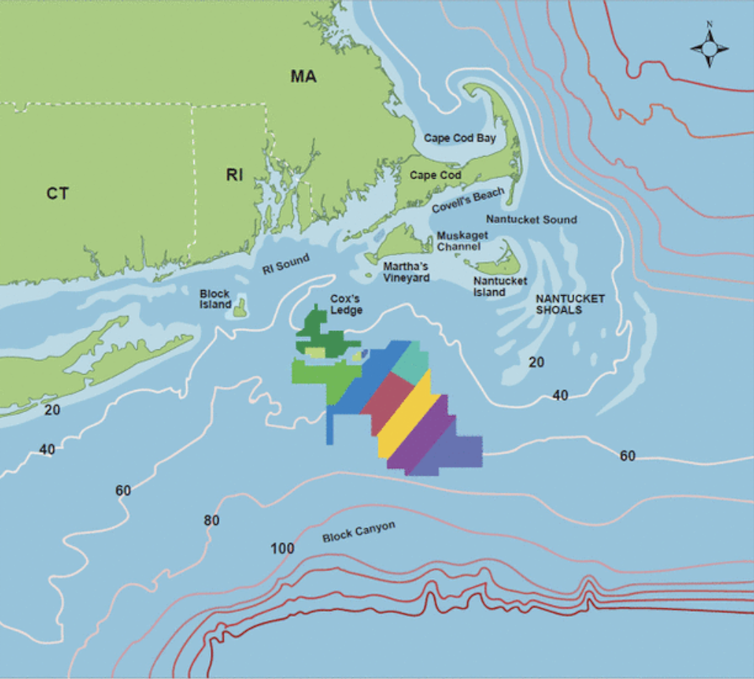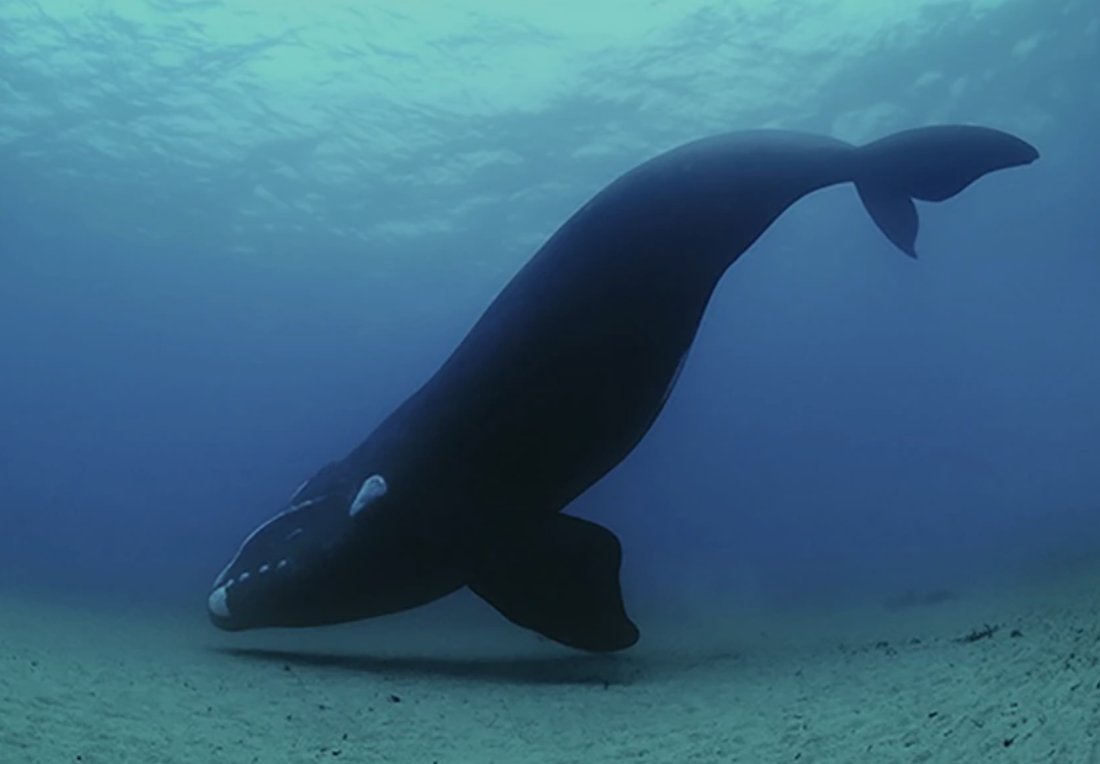News
As the US begins to build offshore wind farms, scientists say many questions remain about impacts on the oceans and marine life
Published: November 15, 2023 8.22am EST
A row of monopiles that will be the base for offshore wind turbines, in the Atlantic Ocean off the coast of Martha’s Vineyard, Mass. David L Ryan/The Boston Globe via Getty Images
As renewable energy production expands across the U.S., the environmental impacts of these new sources are receiving increased attention. In a recent report, the National Academies of Sciences, Engineering, and Medicine examined whether and how constructing offshore wind farms in the Nantucket Shoals region, southeast of Massachusetts, could affect critically endangered North Atlantic right whales. The Conversation asked marine scientists Erin L. Meyer-Gutbrod, Douglas Nowacek, Eileen E. Hofmann and Josh Kohut, all of whom served on the study committee, to explain the report’s key findings.
Why did this study focus on such a specific site?
The Bureau of Ocean Energy Management, which is part of the U.S. Department of the Interior and regulates offshore energy production, asked the National Academies to conduct this study. Regulators wanted to better understand how installing and operating offshore, fixed-bottom wind turbine generators would affect physical oceanographic processes, such as tides, waves and currents, and in turn how those changes could affect the ecosystem.
For example, offshore wind turbines decrease wind speeds behind them, and the presence of their structures makes the water more turbulent. These changes could affect ocean currents, surface wind speeds and other factors that influence hydrodynamics – the structure and movement of the water around the turbines.
The Nantucket Shoals region is a large, shallow area in the Atlantic that extends south of Cape Cod. Our report focused on it because this is the first large-scale offshore wind farm area in the U.S., and the region has been included in several recent hydrodynamic modeling studies.

Map of the Nantucket Shoals region, showing current wind-power lease areas (colored zones) and water depth contours (red and white lines) in meters. NASEM 2023, CC BY-ND
North Atlantic right whales are critically endangered. Scientists estimate that the population is down to just 356 animals. This species was almost driven to extinction after centuries of commercial whaling. Even though the whales have been protected from whaling for almost 100 years, they are still accidentally killed when they are hit by vessels or become entangled in fishing gear. These two sources of mortality are responsible for most documented juvenile and adult right whale deaths over the past 25 years. There are options for protecting them, such as slowing or rerouting boats, shortening the fishing season or even modifying fishing gear to make it more whale-safe. However, regulators need to know where the whales are going to be and when they’ll be there, so they can put those protections in place. It’s usually hard to figure out where whales are – they have a large habitat and spend most of their time below the surface of the water, where observers can’t see them. Recently it’s gotten even harder, because climate change is causing whales to shift where and when they feed. Currently, right whales are spending more time around the Nantucket Shoals region. This means scientists and managers need to make sure that wind energy development in the area is happening safely and that threats to whales in the area are reduced. Right whales are filter feeders that consume huge quantities of tiny zooplankton. The whales need to find large, dense patches of zooplankton at appropriate water depths in order to feed. Altering waves, tides and currents in ways that affect where their prey are located could affect whale feeding or cause the whales to change foraging habitats.
PREVIOUS:Wheaton Precious Metals secures $530m in existing streams
NEXT:Lithium-ion battery fires are a growing public safety concern − here’s how to reduce the risk
Why are North Atlantic right whales of special concern?
How might offshore wind farms affect right whales in the study area?
RELATED NEWS
- O+ Tower Project Showcases Our Production Prowess 2025-02-20
- Guangdong Aluminum Association and Moscow University Business School visited Gua 2024-12-12
- Guangdong Aluminium Association International Trade Co., Ltd. signed an overseas 2024-11-21
- Guangdong Aluminum Association International Trade Co., Ltd. Participates in the 2024-11-15
- Simplified Approach to Spandrel Area Treatment in Curtain Wall Glazing 2024-10-25
CATEGORIES
LATEST NEWS
CONTACT US
Contact: Manager:Miss Jasmien
Phone: +8618825429836
E-mail: info@gdaa-cn.com
Whatsapp:+8618825429836
Add: Headquarter:No.8,Yixian Road,GDAA Mansion,Guangfo Zhicheng, Dali Town,Foshan,Guangdong.China

